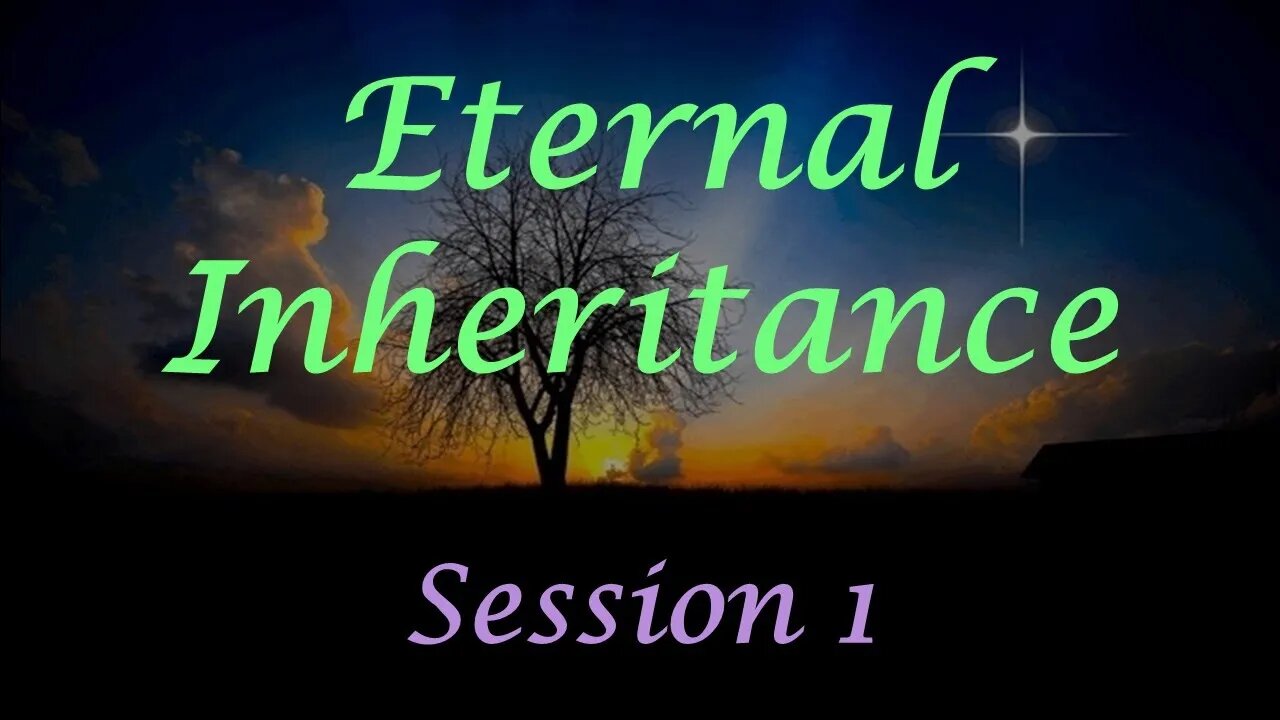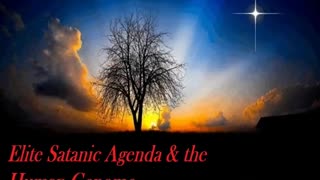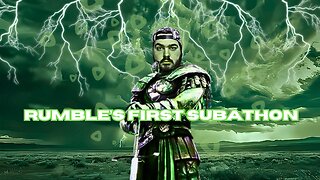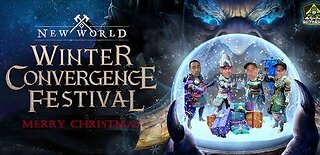Premium Only Content

Eternal Inheritance - Session 1
This is the first of five messages Doug gave in his interviews with GeorgeAnn Hughes in her podcast, The ByteShow in September-October 2010.
o Doug explains the clear difference between unmerited salvation and the inheritance that requires obedience, conflict, conquest, warfare that requires dispossessing the enemy. Using the experience of Israel being delivered from Egypt and given the land of their inheritance that required this same conquest: “Salvation is on this side of the Jordan, that is on the east side of the Jordan; the inheritance is on the west side of the Jordan. And they’re not the same thing.”
o The promised land “Canaan does not represent heaven; Canaan represents fulness; it represents entering in to the fulness of one’s inheritance.”
o “Salvation is just the beginning; it just opens the door and positions the believer to begin the process through sanctification of coming into possession of their full inheritance in Christ.”
o Just because when we are saved, born into God’s family, and given the rights and privileges as the firstborn as joint heirs with Christ, doesn’t guarantee we end up there. If we are like Esau, the firstborn of Isaac, who despised these rights and traded them for ‘a mess of pottage’ – we rather have some temporal desire fulfilled to gratify our soulish appetite – we will end up losing those rights of the firstborn. We don’t lose our position as being a member of God’s family – we lose our inheritance, and it goes to another. We lose the opportunity to rule and reign with Christ for eternity – the right of the firstborn.
o “This is not taught in churches; I’ve never heard this taught in churches, and yet it’s clearly in the word of God.” Expositors, when they explain the passages about inheriting eternal life or the inheritance, “They make that equivalent to salvation; in other words, if you’re saved, you have the inheritance. If you have the inheritance, that’s equal to salvation, and nothing can be further from the truth! Salvation brings in the potentiality of the inheritance, but it’s not a guarantee.”
o The understanding of the inheritance and how one obtains it requires us to understand what it means to be the ‘firstborn’ – and as this may seem somewhat technical to those not familiar with it, it may require more than a one-time listen to this important message. Hang in there and persevere! It’ll be worth it. We don’t want to be like Esau who despised his birthright as the firstborn, but we should be like Jacob, wrestling with the Angel all night if necessary, to obtain the blessing.
o “When you lead someone to Christ, they are not a disciple until they are a follower of Christ. And that means discipleship – that means training – that means instructing them.” Not all believers are necessarily disciples, though all disciples of Christ are believers.
o When Jesus was born in Bethlehem, he did not come as ‘the second man’. He became ‘the second man’ at His resurrection.
o “Salvation doesn’t guarantee inheritance; it does not guarantee full reward; it doesn’t guarantee we will reign with Him. It make it possible; it’s the doorway, but it’s not the end game.”
o “By our union with Christ (experiential – not positional), we enter in to that fulness of who He is as firstborn, having that place of preeminence over Israel, over the nations, over angels.”
o In spite of the many who believe the redemption of man is God’s original and ultimate purpose, Doug explains, “Redemption is recovery – to bring man back into alignment with God’s original purpose which originated in eternity past before the creation of the universe, before there ever was a Lucifer who rebelled. That purpose reaches into eternity past.”
o “Our inheritance in Christ – God’s inheritance in us – is interrelated, interconnected, interdependent; it’s not two different things.”
o “Every Christian has a different measure of Christ according to obedience, according to walking out - walking in the light that He’s given us, and living in the light that He lived (1 John 2:4-6), walking as He walked. The more we walk as He walked, as He learned to abide in the Father, and we, therefore, through the Holy Spirit, who holds that secret of the Man Christ Jesus abiding in the Father; He holds the secret, He holds the essence, He holds the meaning of the abiding of the Son of Man into the Father.”
o “God’s eternal purpose is not that we get born again, and we’re just left there; that’s the door, that’s the opening. The new birth brings us to the threshold of God’s eternal purpose. Partaking of the Passover lamb and then settling down in Egypt does not result in one’s inheritance.”
o Doug explains the difference between being born into a family and being a child, and later reaching adult sonship through adoption. None of us were initially adopted into God’s family – we were born again. When we grow up and can be entrusted to carry out our Father’s business, we are then adopted into sonship.
-
 1:08:26
1:08:26
Morning Star - Book Ministry
1 year agoElite Satanic Agenda & The Human Genome Project
4102 -
 LIVE
LIVE
TheSaf3Hav3n
3 days ago| RUMBLES FIRST SUBATHON IS HERE!!! | DAY 4 |
2,003 watching -
 3:14:33
3:14:33
Joe Donuts Gaming
10 hours ago🟢 Live : Christmas is Here!! | Fortnite, Caroling, Light Tours and Donos !!
38.8K11 -
 6:02:38
6:02:38
CLUJ
9 hours agoCHRISTMAS EVENING HYPE!! LETS HAVE FUN GAMING!!
36.6K7 -
![I AM FINALLY BACK :: PUBG: BATTLEGROUNDS :: RUMBLE NOW HAS GIFTED SUBS!!! [Merry Christmas] {18+}](https://1a-1791.com/video/fwe1/22/s8/1/e/f/C/6/efC6v.0kob-small-I-AM-FINALLY-BACK-PUBG-BATT.jpg) 9:57:19
9:57:19
a12cat34dog
11 hours agoI AM FINALLY BACK :: PUBG: BATTLEGROUNDS :: RUMBLE NOW HAS GIFTED SUBS!!! [Merry Christmas] {18+}
26K4 -
 3:55:42
3:55:42
STARM1X16
10 hours agoMerry Christmas Fortnite
73.5K11 -
 2:45:33
2:45:33
Sgtfinesse
10 hours agoMerry Christmas Night
61.1K18 -
 3:51:18
3:51:18
tacetmort3m
1 day ago🔴 LIVE - (MERRY CHRISTMAS) TIME TO SPREAD DEMOCRACY - HELLDIVERS 2 OMENS OF TYRANNY
34.4K2 -
 2:46
2:46
BIG NEM
14 hours agoDiscovering RAKIJA: The Holy Liquer of the Balkans
23.5K2 -
 1:11:38
1:11:38
Film Threat
18 hours agoCHRISTMAS DAY CHILL STREAM WITH CHRIS GORE | Hollywood on the Rocks
143K31